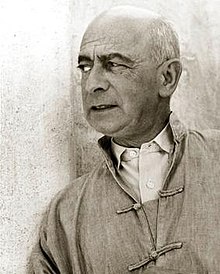|
Paul T. Frankl
Paul T. Frankl (October 14, 1886 – March 21, 1958), an Art Deco furniture designer and maker, architect, painter and writer from Vienna, Austria, was the son of a wealthy real estate speculator. Biography After Frankl completed his architectural studies at the Technische Hochschule in Charlottenburg (now Technische Universität Berlin), he traveled, spending time in Berlin and Copenhagen before arriving in the United States in April 1914. He settled in New York City and brought with him an outsider's fresh perspective and an enthusiasm for forging a uniquely American design aesthetic. Frankl began as an architect and later switched to designing and painting fine art and furniture. In the years between the two world wars he, more than any other designer, helped shape the distinctive look of American modernism.  In the 1920s, he introduced his celebrated skyscraper style (before turning to metal furnishings in the 1930s). Frankl opened Frankl Galleries on 48th Street, calling his company Skyscraper Furniture, which became an epicenter of American modernism, including modern textiles and wallpapers imported from Europe.[1] His solo art shows included New York City's Knoedler Gallery in 1931 and Los Angeles's Stendahl Gallery in 1944.[2] After he later relocated to Los Angeles and opened a gallery on Rodeo Drive in Beverly Hills, celebrities such as Fred Astaire, Cary Grant, Katharine Hepburn, Walter Huston and Alfred Hitchcock became clients. Frankl wrote several books and magazine articles about the Modern Style and was its most vocal proponent. He established the American Union of Decorative Artists and Craftsmen (AUDAC) in 1928.[3] He later designed production pieces for Brown Saltman of California and Johnson Furniture Company of Grand Rapids, incorporating an early use of biomorphic designs and novel materials such as cork veneer.[4] His style continuously evolved, from early skyscraper furniture to relaxed and casual designs favored by the Hollywood elite in the 1930s to manufactured pieces for the mass market in the 1950s.[5] In 1934 he moved to Los Angeles where he taught at the University of Southern California and the Chouinard Art Institute. Used, out-of-print books he authored sell for hundreds of dollars in online bookstores.[6] His daughter, Paulette Frankl, is an artist, author and photographer,[7][8] and his grandson, Nicholas Koenig,[9] is a creative director for theme parks and interactive games. Books
Collections
References
External links |
||||||||||||||||||
